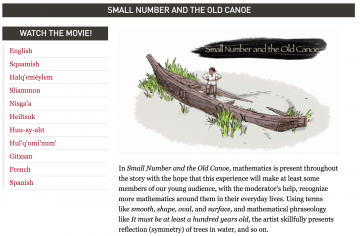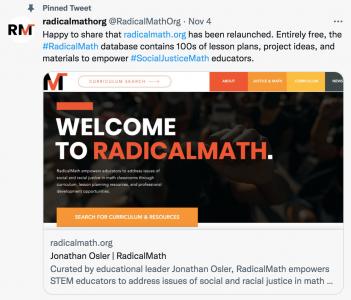The Math Catcher Outreach program aims to promote mathematics and scholarship in general by encouraging elementary and high school students to recognize how math is used in everyday life and how it forms the basis for many of our daily decisions and life-long choices. The Math Catcher program is a science outreach initiative at Simon Fraser University run by SFU faculty, staff members and students who volunteer their time towards the program. This week in the mentoring circle, we explore math through storytelling, pictures, models, problem-solving, and hands-on activities that encourage young people to enjoy numbers and help dispel the myth that math is boring and rigid.
Math Catcher aims to tackle the stigma surrounding mathematics among Indigenous and non-Indigenous youth through a series of initiatives. These include school visits, workshops, academic summer camps, tutoring programs, and the creation of learning digital resources in various First Nation languages. The aims of the program are straightforward:
- to demonstrate that mathematics is part of everyday life and consistent with Indigenous culture;
- to prove that mathematics can be interesting and even fun;
- and to emphasize that mathematics can lead to a rewarding future.
To promote mathematics among Indigenous learners, Math Catcher has created a series of stories with mathematical themes. These stories are based on the storytelling traditions of Indigenous peoples. Learn why and how Veselin Jungic and Mark MacLean created the program in an interview from NCCIE below.
Veselin Jungic from SFU and Mark MacLean from UBC co-wrote the first story called Small Number Counts to 100, which served as the cornerstone of the Math Catcher Outreach Program. This first story was inspired by narration from Ms. Rina Sinclair of the Siksika Nation. The story can be shown to elementary school students as a counting practice/puzzle or as a pattern recognition problem. For high school students, it can be a way to introduce arithmetic progressions, modular addition, or an idea of number systems with a base different than 10. This short animation movie is a math education digital resource based on Aboriginal culture with the voice of Dexter Anakson of the Cree Nation – Piapot First Nation Band. Watch the short animation below.
Math Catcher introduces mathematics and science to students through the use of First Nations imagery and storytelling. Take a moment to explore through their digital resources and learn from each of the stories, you will see and hear many different translations of each story. You will notice how most of the stories featured have been translated into several Indigenous languages as well as French. Math Catcher has produced animated films in First Nations languages including Blackfoot, Cree, Squamish, Heiltsuk, Nisga’a, Tla’amin, Halq’em ́eylem, Hul’q’umi’num’, and Huu-ay- aht as well as bilingual picture books in Blackfoot/English, Cree/English, Squamish/English, Nisga’a/English, and Tla’amin/English.
Math Catcher is based on the belief that it is crucial that we engage students in mathematics and science at an early age. The Small Number films incorporate problem-solving and Indigenous traditions into three to four-minute-long animated stories. Small Number is a young Indigenous boy who has an impressive aptitude for mathematics – and also a proclivity for getting into trouble. Small Number’s adventures take place in different physical contexts in different Indigenous communities, yet the clever, playful protagonist remains the same. Watch below Small Number and the Old Canoe, a short animation aimed at transforming math into a star.
RadicalMath empowers educators to address issues of social and racial justice in math classrooms through curriculum, lesson planning resources, and problem-solving. It works to integrate issues of economic and social justice into math classes and seeks to inspire and support other educators to do the same. They believe that math literacy is a civil right and are committed to making sure classrooms are places that are nurturing for all students, that celebrate different cultures, stories, and styles of learning, and that reflect just societies. RadicalMath encourages students to ask the question: “What are the problems that my community is facing, and how can I use math to understand and help solve them?” They seek to foster a love of mathematics and allow for the exploration of mathematical ideas on abstract, theoretical, experimental and artistic levels. Visit the RadicalMath website to find progressive digital resources and much more.


